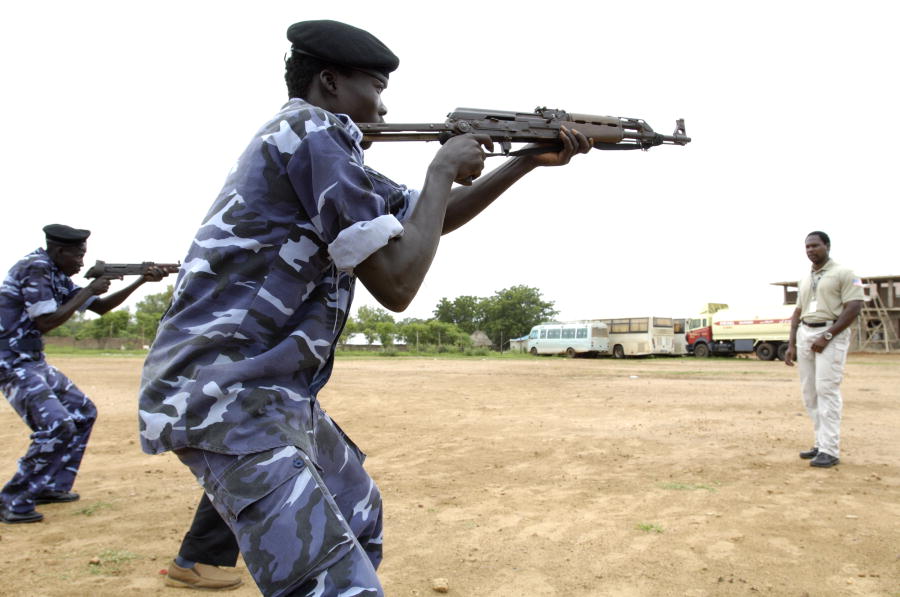Photo credit: U.N Photo
Context:
The United Nations doesn’t have Peacekeepers, they have soldiers deployed as Peacekeepers. Peacekeeping missions are not military operations, therefore, Peacekeeper training should better reflect the peaceful mandate of the UN and abandon the militarized culture and tactics present in today’s Peacekeeping forces.
In the News:
“UN peacekeeping often works: overwhelming evidence tells us it saves lives, and—usually—keeps peace (see here, here, here, and here). Despite the successes of peacekeeping, scholars and policymakers alike continue to explore how to make peacekeeping even more effective. Several recent proposals have focused on improving procedures of the UN Security Council and mission mandates, as well as on increasing resources (as in the Cruz report’s call for “overwhelming force”). Such suggestions, however, neglect two critical facts about peacekeeping:
- “We still have no peacekeepers per se. Rather we have soldiers deployed as peacekeepers. In other words, nation-state militaries are the backbone of all peacekeeping missions—yet they’re not primarily designed for the tasks of peacekeeping. Within nation-states, military personnel are recruited, socialized, trained, and promoted for one core task: combat. Peacekeeping still has a secondary role in the military doctrines, training templates, and cultures of most Troop Contributing Countries (TCCs).”
- “Not all peacekeeping forces are the same. The debate on peacekeeping focuses a lot on numbers, implicitly assuming that one peacekeeping soldier is just like another. Among both policy and academic circles, there seems to be a widely held assumption that military contingents—regardless of their origins—implement peacekeeping mandates in a similar manner. In my research, I find that military culture—the set of attitudes, values, and beliefs instilled into an army and transmitted across generations of those in uniform—influences how soldiers behave at the tactical level. When troops deploy abroad, their military cultures go with them.”
“Peacekeeping often works, but it could work better and more consistently. Improved procedures and more resources will not, on their own, make this happen. Peacekeeping is not and should not become like any other kind of military operation. Neglecting this reality risks depriving UN peacekeeping of the political capital, credibility, and legitimacy acquired over the past few decades. Moving forward, greater emphasis must be placed on developing soldiers into peacekeepers, and a critical part of this task is for contributing militaries to adopt organizational cultures that appreciate the unique demands of peacekeeping missions.”
Insight from Peace Science:
Robust Peacekeeping: The use of force by a United Nations peacekeeping operation at the tactical level, with the authorization of the Security Council, to defend its mandate against spoilers whose activities pose a threat to civilians or risk undermining the peace process.
- Robust peacekeeping, though it may succeed in protecting civilians in the short-term, has unintended consequences that may jeopardize other important goals and the broader work of UN missions.
- The greater militarization and partiality entailed by robust peacekeeping may actually put civilians at risk, along with peacekeepers, other UN officials, and independent humanitarian actors, in some cases also diminishing humanitarian space/access.
- The state-centrism entailed by robust peacekeeping may compromise the more substantive aspects of a UN mission, prejudicing its human rights, peacebuilding and development, and political work too far in favor of the government’s concerns at the exclusion of others’.
- The “robust turn” in UN peace operations may more broadly jeopardize peacekeeping principles and consensus around UN peacekeeping, cause a drop in troop contributions from UN member states, and impede cooperation between the UN and humanitarian actors.
References:
- “Making Efforts to Improve UN Peacekeeping” By Chiara Ruffa for Political Violence @ A Glance. July 25, 2018
- Peace Science Digest Volume 2, Issue 2: “The Unintended Consequences of ‘Robust’ UN Peace Operations”.

